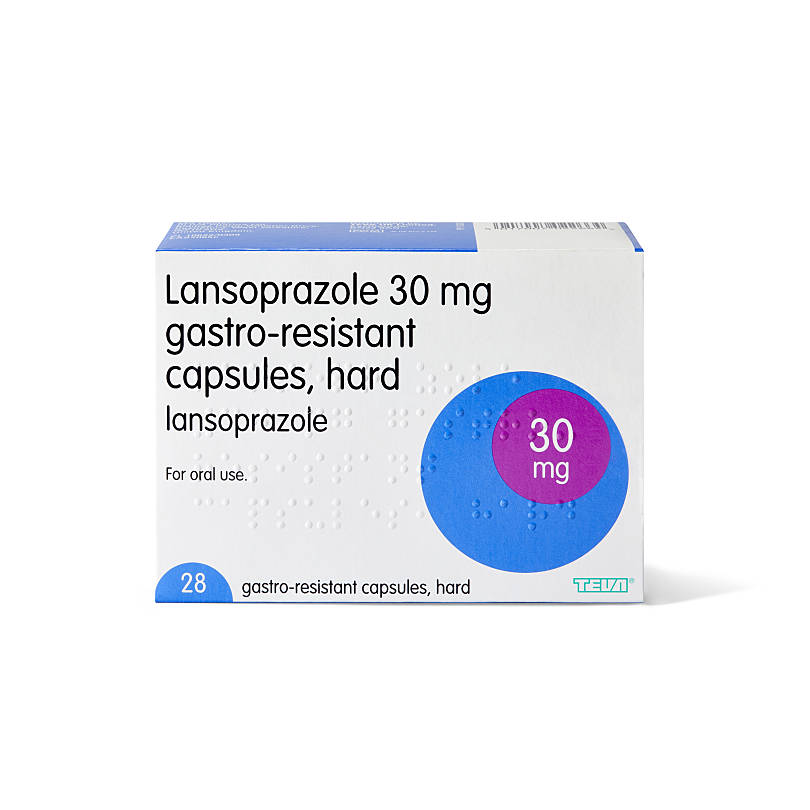Lansoprazole
Lansoprazole is a medication used to reduce the amount of acid made in your stomach. It treats heartburn, indigestion, acid reflux, and gastroesophageal reflux disease (GORD).










Prices from £15.00
In stock. Simply fill in a brief questionnaire. One of our doctors will review your order and prescribe a suitable treatment. How to Order
-
Lansoprazole is a type of medication called a proton pump inhibitor (PPI) and is used to treat heartburn, indigestion, acid reflux, and gastroesophageal reflux disease (GORD). Lansoprazole starts working quickly and, when taken as prescribed, is effective in reducing the symptoms caused by these conditions. It is a prescription-only medication that is available in 15mg and 30mg capsules.




About lansoprazole
-
-
Lansoprazole is a medication called a proton pump inhibitor (PPI) that works to relieve the symptoms associated with heartburn, indigestion, acid reflux, and gastroesophageal reflux disease (GORD). It can also be used in the treatment and prevention of stomach ulcers.
Lansoprazole is a generic medication but can also be found under the branded name Zoton FasTabs.
Lansoprazole vs omeprazole
Both lansoprazole and omeprazole are the same type of medication called PPIs. These both work by reducing how much acid is produced in the stomach to treat the symptoms of heartburn, indigestion, acid reflux, and stomach ulcers. However, both medications contain different active ingredients. As the active ingredient is different, these medications can come in different doses and may affect you slightly differently.
If lansoprazole is not working or is causing unwanted side effects, your doctor may want to try omeprazole instead. One study found that both medications are effective for reducing stomach acid, but lansoprazole worked faster to relieve symptoms. Your doctor will decide which of these treatments is most suitable for you based on your needs and medical history. You may try one treatment and find it’s not effective and be offered an alternative.
-
-
Lansoprazole capsules work by reducing the amount of acid your stomach produces, which helps treat symptoms of acid reflux.
Lansoprazole capsules are a type of medication called proton pump inhibitors. These work by blocking the proton pumps in your stomach lining. Proton pumps are enzymes that help to make stomach acid. When lansoprazole stops (inhibits) your proton pumps from working correctly, this reduces the amount of stomach acid you produce, which relieves the symptoms of acid reflux caused by excess stomach acid.
How effective is Lansoprazole?
Lansoprazole is an effective treatment, but some things can affect how well it works. To get the most from your treatment, you should:
- try to avoid foods that trigger your symptoms, such as spicy, rich, greasy, or fatty foods, caffeinated drinks, and acidic food and drinks
- cut down on the amount of alcohol you drink, as alcohol can cause or worsen heartburn and acid reflux
- quit smoking if you can
- avoid eating at least 3 hours before you go to bed if you usually get symptoms in the night
- sleep with your head and shoulders propped up on a pillow, as this can reduce acid reflux at night
How long does lansoprazole take to work?
Lansoprazole can reduce symptoms within 2 to 3 days of taking it. It can take up to 4 weeks to get the full effect of this medication. This means you can still have some symptoms during this time.
-
-
If you’ve been prescribed lansoprazole once a day, you should take it first thing in the morning with a glass of water. If you have been prescribed lansoprazole to be taken twice a day, you should take it in the morning and evening. You should aim to take to your lansoprazole at the same time every day to get the most out of it.
Lansoprazole should be taken at least half an hour before you have a meal or snack. Do not take lansoprazole with food. This can affect how well it works.
Lansoprazole and alcohol
You can drink alcohol whilst taking lansoprazole, but it is recommended to reduce or avoid alcohol consumption. Drinking alcohol can make your symptoms worse, as alcohol causes your stomach to produce more acid.
How often can I take lansoprazole?
You will take lansoprazole once or twice a day, depending on why you are taking lansoprazole. You should not take it every time you get symptoms, as taking too much can cause side effects.
How long should I take lansoprazole for?
You should take lansoprazole for as long as you have been prescribed it.
This is most commonly every day for 4 weeks. If you’re still getting symptoms after this, you should speak to your doctor. Lansoprazole can be used as a long term treatment if needed, but you must speak to your doctor beforehand. If you are taking lansoprazole over a longer period, your doctor will regularly check to make sure it’s still working and safe and suitable for you to take.
Lansoprazole dosage
The usual dosage of lansoprazole is:
- 15mg to 30mg a day for indigestion, heartburn, and acid reflux
- 30mg a day for stomach and duodenal ulcers
Your dose may be lower depending on your age or if you have liver problems. If you miss a dose, you can take it as long as there are more than:
- 12 hours before your next dose if you take lansoprazole once a day
- 4 hours before your next dose if you take lansoprazole twice a day
Never take a double dose, as this can increase the risk of side effects.
-
-
You can take lansoprazole if you have acid symptoms and have been prescribed it by your doctor. You should not take it if you have ever had an allergic reaction to lansoprazole or other PPIs.
Talk to your doctor before taking lansoprazole if you:
- have or are at risk of having low vitamin B12 levels
- are going to have a blood test called Chromogranin A
- have a serious liver disease
- have an intolerance to some sugars, as lansoprazole capsules contain sucrose
Lansoprazole is suitable for most people, but you should speak to your doctor first if you:
- are trying to get pregnant, are pregnant, or are breastfeeding
- have had an allergic reaction to lansoprazole or any other PPI
- have problems with your liver
- are going to have an endoscopy, as you will need to stop treatment a few weeks before
-
-
Lansoprazole can cause some side effects, but these usually go away within a few weeks of treatment. Speak to your doctor if the side effects are bothering you or do not go away.
Common side effects of lansoprazole include:
- headache
- dizziness
- diarrhoea, constipation, wind, stomach pains
- nausea or vomiting (feeling or being sick)
- dry or sore throat or mouth
- itching or skin rash
- tiredness
- benign polyps (growths) in the stomach
Uncommon side effects of lansoprazole include:
- joint or muscle pain
- depression
- fluid retention or swelling
- fractures of the wrist, hip, or spine
For more information and a full list of side effects, read the patient information leaflet online or located in your medication packet.
Call 999 or go to A&E straight away if you get any serious side effects, such as:
- a very severe skin reaction, such as reddening, severe inflammation, skin loss, or blistering
- a serious allergic reaction
- inflammation of the liver, which can cause yellowing of the skin and eyes
Are there any long term side effects?
Taking lansoprazole for 3 months or more can cause your magnesium levels to drop. Low magnesium causes symptoms such as:
- tiredness
- dizziness
- confusion
- shakiness
- irregular heartbeat
- muscle twitches
Taking lansoprazole for over a year can increase the chance of some side effects, including:
- gut infections
- bone fractures
- vitamin B12 deficiency, symptoms include mouth ulcers, a sore and red tongue, pins and needles, and feeling very tired
When taking lansoprazole long term, your doctor will check your health regularly to make sure it remains a suitable treatment.
-
-
Some medications can interact with lansoprazole, making it less effective or increasing the risk of side effects. Speak to your doctor about any medications you are taking, especially:
- St. Johns wort, a herbal remedy for depression
- sucralfate, for healing ulcers
- antacids, used to treat acid reflux and heartburn
- fluvoxamine, used to treat mental health conditions
- tacrolimus, for preventing transplant rejection
- theophylline, for asthma treatment
- warfarin, used to treat blood clots
- digoxin, for treating heart problems
- itraconazole, rifampicin, or ketoconazole, used to treat infections
- methotrexate, for the treatment of cancer and autoimmune disease
- nelfinavir and atazanavir, used to treat HIV
Lansoprazole is usually an effective treatment, but some things can change how well it works. To get the most from your treatment, you should:
- try to avoid foods that trigger your symptoms, such as spicy, rich, greasy, or fatty foods, caffeinated drinks, and acidic food and drinks
- cut down on the amount of alcohol you drink, as alcohol can cause or worsen heartburn and acid reflux
- quit smoking if you can
- avoid eating at least 3 hours before you go to bed if you usually get symptoms in the night
- sleep with your head and shoulders propped up on a pillow as this can reduce acid reflux at night
In rare cases, lansoprazole can cause a severe allergic reaction. Symptoms of this include fainting, dizziness, difficulty breathing, and swelling in the face. Call 999 or go to A&E straight away if you think you are having a severe allergic reaction.
-
-
Other PPIs
If lansoprazole is not suitable for you, there are other PPIs that you can try. These include omeprazole, pantoprazole, and esomeprazole. You may find one PPI works better than another for your symptoms or does not cause side effects.
H2 blockers
Also called histamine antagonists, H2 blockers also reduce the amount of acid your stomach makes, but they work differently from PPIs. These include famotidine (Pepcid), nizatidine, and cimetidine (Tagamet). H2 blockers are usually prescribed if you get side effects from PPIs.
Antacids
Antacids can provide quick relief from indigestion, heartburn, and acid reflux. These are found over the counter in supermarkets or pharmacies. Calcium carbonate (Tums), Maalox, sodium carbonate, and Milk of Magnesia are best for occasional symptoms of indigestion and heartburn. Gaviscon can help with acid reflux symptoms.
-
-
When is the best time to take lansoprazole?
The best time to take lansoprazole is first thing in the morning. This means it can work to relieve symptoms throughout the day. . When taking lansoprazole twice daily, take it in the morning and evening. Whenever you take your medication, you need to make sure it’s at least 30 minutes before food.
How long does lansoprazole stay in your system after you stop taking it?
After you stop taking lansoprazole, it is likely to be out of your system in less than 24 hours.
Lansoprazole has a short half life, meaning it only takes 1 to 2 hours for the amount of medication in your body to reduce by 50%.
Can you buy lansoprazole over the counter?
No, lansoprazole is not available over the counter. It is a prescription only medication.
Can you get lansoprazole on the NHS?
Yes, you can get lansoprazole on the NHS by making an appointment with your GP. They will discuss your symptoms and may carry out some tests to make sure it’s safe and suitable for you.
Can I take lansoprazole with other heartburn medication?
You can take antacids with lansoprazole, but make sure to wait at least an hour after taking lansoprazole, or your medication may not work properly. You should not take lansoprazole with other PPIs.
What is the difference between lansoprazole and pantoprazole?
Pantoprazole is the same type of medication as lansoprazole and works in the same way. However, they contain different active ingredients, so there are some small differences in how they work and affect you.
- Pantoprazole is usually prescribed in 20mg or 40mg doses, whereas lansoprazole is prescribed as 15mg or 30mg.
- Pantoprazole needs to be taken an hour before food, whereas lansoprazole can be taken 30 minutes before food.
- You can get pantoprazole 20mg over the counter if you have heartburn or acid reflux. Lansoprazole is only available on prescription.
- Both medications can be taken long-term, but you should always discuss this with your doctor beforehand.
Does lansoprazole cause weight gain?
Lansoprazole has not been proven to cause weight gain, but an uncommon side effect of taking it is fluid retention. This can cause swelling in your body because your body is holding onto excess fluid. This is not the same as weight gain. Speak to your doctor if you think you have fluid retention.

Babak studied medicine at King’s College London and graduated in 2003, having also gained a bachelor’s degree in Physiology during his time there. He completed his general practice (GP) training in East London, where he worked for a number of years as a partner at a large inner-city GP practice. He completed the Royal College of GPs membership exam in 2007.
Meet our doctorsArticle created: 11 Jan 2023
-
Heartburn and acid reflux, NHS [accessed 08 November 2022]
-
Lansoprazole, NHS [accessed November 2022]
-
Lansoprazole 30mg Gastro-Resistant Capsules, Patient Information Leaflet, EMC [accessed 08 November 2022]
-
Gastro-oesophageal reflux disease, NICE/BNF [accessed 08 November 2022]


GMC: 7074021

GMC: 6149061

GMC: 7085115







